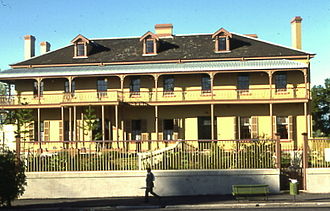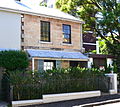Robert Cooper (Australian businessman)
Robert Cooper (1777-1857) was an Australian businessman in the early Colonial era of Sydney, responsible for the construction of many notable buildings and commercial ventures.
Cooper was born in London on 15 May 1777 to fishmonger Francis and Frances (née Pilkinton) Cooper,[1] and ran two public houses in London, the White Swan on Ratcliffe Highway in the docklands and another in Piccadilly. In October 1812 he was convicted of smuggling and receiving stolen goods and was sentenced to penal transportation for fourteen years to New South Wales[2] arriving on the Earl Spencer in October 1813. He received a conditional pardon in 1818.

In Sydney he was a prolific businessessmen. a partner in Cooper and Levey, he opened a shop in George Street opposite the Town Hall and was running trading ventures to Van Deimansland in a small ship he bought. He also obtained an Auctioneer's licence and opened a distillery[3] and brewery.
Other ventures included milling flour and bread, cedar cutting, production of gunpowder, and weaving of cloth.
By 1830 he was one of the most wealthy men in Sydney becoming one of the principal shareholders in the Bank of New South Wales. He also owned large tracts of land in Paddington, Chippendale, Leichardt and Waterloo, Sydney. He stood for the New South Wales Legislative Council in 1843 but ran last.[4]
He established Willeroo Station on the shore of Lake George, outside of Canberra Australia, and built Juniper Hall in Paddington[5] at the time the largest house in the Colony of New South Wales. He also commissioned Paddington Town Hall and founded Sydney Grammar School.
Paddington Town Hall

Underwood Street Paddington
Family life[]
Cooper was known affectionately as 'Robert the Large'. He had three wives. Cooper's first wife died in 1818 in England soon after his conviction, his second wife, Elizabeth Kelley, died in childbirth 1821 in January 1822 he married a third time to Sarah May, from the Hawkesbury River district. Altogether he had some twenty-eight children. His son Frederick Augustus (1834-1908), became a barrister and served as a member of both the New South Wales and Queensland legislatures, another Robert Cooper was Mayor of Ulladulla in 1896. His grandson was Sir Pope Alexander Cooper, Attorney General of Queensland and also Chief Judge of the Supreme Court of Queensland. [6]
Cooper died at Paddington on 25 May 1857, aged 80, and his wife Sarah died on 6 November 1863.
References[]
- ^ The National Archives - England & Wales Prerogative Court of Canterbury Wills, 1384-1858
- ^ 'Old Bailey', Times (London), 31 Oct 1812, p 2, 2 Nov 1812, p 3 and 3 Nov 1812, p 2
- ^ Scratching Sydneys Surface.
- ^ Sydney Morning Herald, 23 Jan, 11, 25 Feb, 14 Apr, 14, 16 June, 29 Nov 1843.
- ^ Mark Dunn, Juniper Hall.
- ^ Francis Cooper 1811-1885, AustralianRoyalty.net.au
External links[]
- Family tree - Robert “Black Bob” Cooper 1777-1857[1]
- ^ Robert “Black Bob” Cooper 1777-1857, AustralianRoyalty.net.au
- Australian businesspeople
- 1776 births
- 1857 deaths

